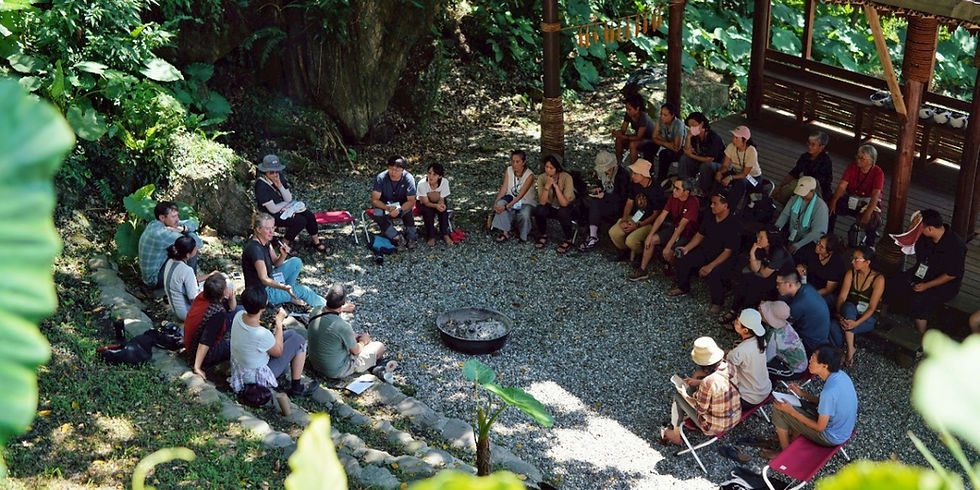Huatung Youths Returning Home
- ACFI

- Apr 2, 2019
- 3 min read

It was common in the past, for Huatung youths to leave their hometown due to its lack of opportunity to sustain their livelihood. In recent years, the youths are slowly returning, bringing gained experiences home with them.
This story highlights three youths who returned, and shares the efforts they have made in their community.

Chuang Chiao-yun: B&B Hostess Yujoy House Chuang Chiao-yun, an Amis from the Zhenbing Tribe of Taitung, spent close to 30 years working in Taiwan’s west coast and overseas. After returning to her east coast hometown, she took on the role as Hostess of Yujoy House. With no prior experience, she learned the operations of running a bed and breakfast (B&B) – from basic etiquette of welcoming guests, to leading a team, learning the booking system, accounting, B&B maintenance, and gardening. After three years as Hostess of Yujoy House, Chuang was invited to join ACF’s Hawaii Cultural Sustainability Educational Tour. Each year, ACF brings together ten to sixteen Huatung youth cultural workers across the private, public and non-profit sectors. Over a span of ten days in Hawaii, the group observes first-hand how Hawaii preserves and promotes its native culture, how it creates sustainable tourism, and modernizes tradition. After Chuang’s return from Hawaii, she actively connects with like-minded individuals to co-learn and co-organize events increasing positive influence in the community. Yujoy House was a project initiated by ACF in hopes to create constructive change in its community by providing hospitality training and job opportunities to youths. It hires locally, sourced goods and produces from neighbouring farmers, and provides business to nearby shops, restaurants and foot reflexology parlours. As part of its mission, 10% of Yujoy House’s profit goes back into the village, building water tanks, restoring the community centre, supporting family activities such as “Storytelling with Children” to name a few.

Wu Mei-fong: Restauranteur Magelahai Restaurant Wu Mei-fong spent many years working as a cook in Taipei. On one occasion, after her return to her native Amis village in Taitung, ACF Chair Stanley Yen spontaneously had her cook a traditional Amis meal for a group of Taipei friends. Within the day, with help from village members to gather fresh produce on land and at sea, and using tableware from her own home, she was able to put together a meal which impressed the city visitors. This experience encouraged her, for the first time, to pursue a path which will allow her to share her native culture and make a positive mark on her community. As a participant of ACF’s Hawaii Cultural Sustainability Educational Tour, the experience widened her horizon. She particularly thrived outside of the lecture-rooms, noticing details such as the native Hawaiian way of weaving, and goods created from it. She found the tribes using pandanus and coconut fibers for thatching, and compared it with a similar shell ginger at home. The dancers at the Polynesian Cultural Center inspired her with their passion and knowledge of their own culture. Following her return to Taiwan, she keenly engaged with village members to actively find ways to preserve and showcase their heritage.

Li Ai: Restaurant and B&B Partner Pakelang Li Ai, son of Pakelang’s proprietor Hawang, returned from the west coast years prior because he deeply missed the Huatung ocean. A graduate of Taitung’s hospitality school, National Cheng Kung Commercial & Aquaculture Senior Vocational High School, he brings new perspectives to the family business. With his cooking skills, he innovates new dishes with wild caught fish and mountain vegetables. Li Ai intends to take measures in focusing on the restaurant’s food safety and hygiene by adopting good practices for sanitation. Together with his father, he also hopes to recreate the Pakelang B&B into a stay which is more suited for the modern-day traveller, yet maintaining its original theme.

Besides the three, many other village youths have begun taking measures to adopt new methods which will help sustain their communities and heritage. Together, they connect, share experiences to find back their culture and confidence.




Comments